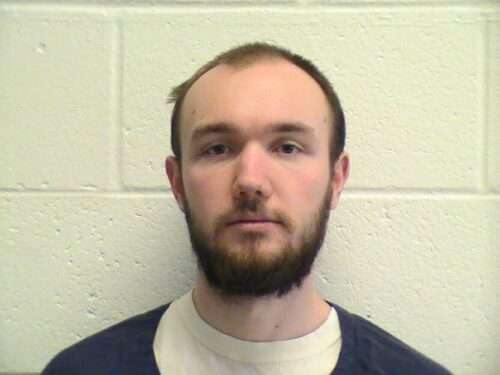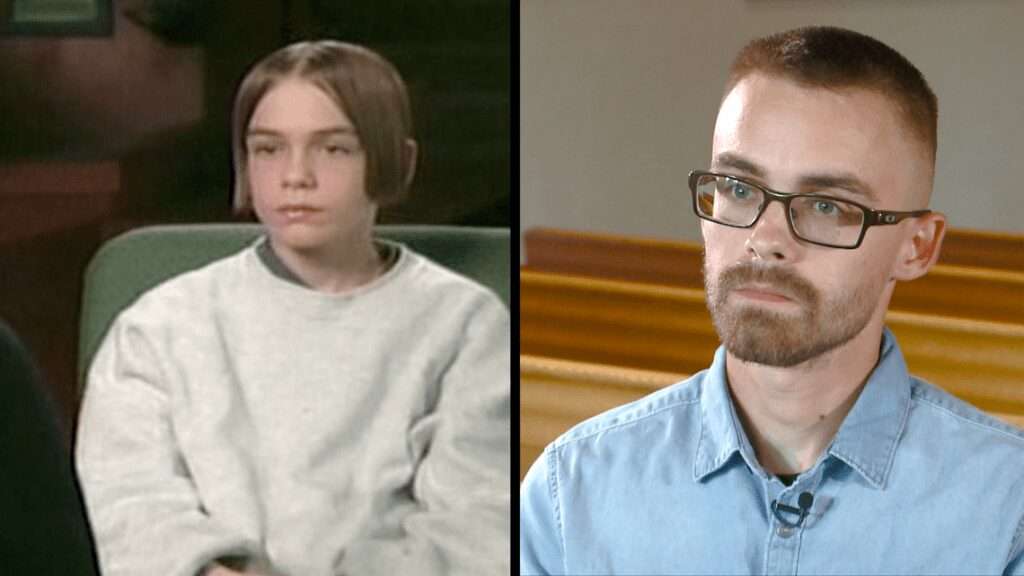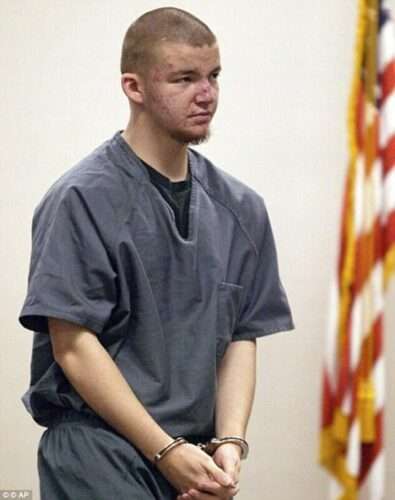
Fourteen year old Shirley Wolf and fifteen year old Cindy Collier had just met the day before the murder that shook a community. According to court documents the two teenage girls decided the best way to get out of their town was to steal a car and the best way to steal a car was to murder its owner.
The two girls walked to a condo and began knocking on doors. When an elderly woman opened the door and let the two girls in they brutally attacked the woman stabbing her over twenty five times before taking her keys and attempting to steal her vehicle. Shirley Wolf wrote in her diary that night “Cindy and I ran away and killed a old lady. It was lots of fun”.
The two girls would be arrested soon after and both would be convicted of first degree murder however the two teen killers were sentenced as juveniles and Shirley Wolf would be released from custody in 1995 and Cindy Collier three years prior.
Cindy Collier and Shirley Wolf Other News
The juvenile scrawl in the lined ledger that 14-year-old Shirley Wolf used as her diary is barely legible. But there is a chilling clarity in the entry dated Tuesday, June 14: “Today, Cindy and I ran away and killed an old lady. It was lots of fun.” It is doubtful that Wolf and her accomplice, Cindy Collier, 15, even knew their victim’s name. That afternoon, amazingly only a few hours after Wolf and Collier had met for the first time, they randomly knocked on doors in a condominium development in Auburn, Calif., 33 miles northeast of Sacramento.
Though the girls used the innocent ruses of asking for directions, a glass of water or to use the phone, their demeanor was unsettling enough to alarm the senior citizens they encountered. Two women locked their doors and windows when they saw them. Joe Becker, 70, allowed them inside. “But after they left, my wife felt so contaminated by them that she immediately washed the glass and scrubbed the phone with alcohol—before we knew anything about the murder.” Anna Brackett, 85, kindly invited them into her neatly kept, two-bedroom condo and spent nearly an hour chatting with them. “We decided we were going to kill her when we saw her,” says Shirley Wolf. “She was just an old lady. Just a perfect setup. We killed her because we wanted her car and we didn’t want to get caught.”
A retired seamstress who had altered draperies for Sears, Mrs. Brackett had great-grandchildren their age and was “very unsuspecting, a helpful person who would certainly give girls some water,” observes her son, Carl Brackett. “She was active and had all her marbles. She wasn’t senile.” When Mrs. Brackett received a call informing her that her son would drive her to a bingo game, the girls decided to act.
Shirley Wolf grabbed Mrs. Brackett by the throat and threw her to the floor, while Collier got a butcher knife from the kitchen and tossed it to Wolf. “Then I stabbed and stabbed,” recalls Wolf. “I stabbed her in the neck because if she lived, she would know who we are and report us. The lady was freaking me out, telling me to stop, that she was dying, I said: ‘Good.’ All of a sudden, blood came out of her mouth so I knew she was dead.” Before leaving, Collier ransacked the condo for money and keys to the 1970 Dodge parked in the garage and then ripped the two telephones from the wall. The keys they had taken wouldn’t start the car. So they fled on foot to nearby Highway 49.
As Carl Brackett, 52, passed them en route to his mother’s home, he said to his wife: “They’re stupid. Two young girls like that hitchhiking. Or else they’re tough.” When he discovered his mother’s body with 28 stab wounds only minutes later, Carl suspected that a deranged patient from a nearby mental hospital might have done it. “There’s a scene in the movie Psycho equivalent to what happened to my mother,” he explains. “I never could have imagined that two teenage girls could have done it.” Nor could the Placer County sheriff’s deputies.
Within an hour, 11 people offered descriptions of the two girls. Though several neighbors who remembered Collier from when she lived with her grandparents in the same development supplied investigators with her name, the deputies remained skeptical. By 2:30 a.m., however, they decided to conduct a routine search of Collier’s home to eliminate her as a suspect, if nothing else. “When I saw them laying there sleeping, I thought, ‘These can’t possibly be the people responsible for the murder,’ ” recalls Deputy George Coelho. “But you go through the motions just to make sure.”
When awakened, Collier, who had been released from Juvenile Hall only the day before, remained calm and silent. Wolf, however, confessed within minutes. After tape-recording Wolf’s confession, deputies then confronted Collier. “She started to laugh,” says Coelho. Then she recorded her own confession. “To honestly tell you the truth, we didn’t feel any badness,” said Collier. “Then after we did it, we wanted to do another one. We just wanted to kill someone. Just for fun.” In her own confession, Shirley Wolf also admitted elation: “We both felt excited. I had done something I had never done before.” The pointless brutality of the slaying and odd lack of remorse was shocking. But even more unusual, according to juvenile-welfare professionals, is that two young girls were even capable of such a violent, physically intimate form of murder as stabbing.
Generally speaking, females tend to turn destructive impulses on themselves, while males lash out at others. Thomas Condit, Wolf’s court-appointed attorney, entered a plea of not guilty by reason of insanity after receiving a psychiatric evaluation of his client. “I’d like to say that Shirley felt sorry,” says Condit. “But I can’t. That’s part of her problem. She told me that while she was killing the old lady, she was thinking of everybody she hated—her father and his mother. But the psychiatrist believes it was a symbolic killing of her own mother.”
Tried as juveniles under state law, both Collier and Shirley Wolf were found guilty of first-degree murder on July 29, and Collier was sentenced to the maximum for minors—incarceration in a California Youth Authority facility until she turns 27. In Wolf’s case, the insanity issue will be heard as a separate phase of the trial. “We’ve got a judicial system that does not work,” says Carl Brackett. “I’m thoroughly disgusted.” Next month, when the proceedings resume, lawyers and psychiatrists will explore the troubling questions which remain: How did two young girls become monstrous, convicted killers? What furious impulses drove them to murder an innocent old woman who offered them only kindness?
Anna Brackett’s killing was a nightmare within the nightmare of Shirley Wolf’s life. Sexually abused from infancy by her father—and occasionally by her paternal grandfather and uncle as well—Shirley’s disruptive behavior drew the attention of an alert teacher as early as kindergarten. But the teacher’s recommendation of psychiatric help was ignored and Shirley ran away for the first time when she was 6. But the mean streets of Brooklyn, where she was born, seemed even more terrifying than staying at home, and she returned within the day. “It was really rough in Brooklyn,” Shirley says. “A lot of people, even kindergartners, carry knives.”
That same year her carpenter father, Louis James Wolf, now 39, had a disabling accident that has since prevented him from working. “Then he stayed home all the time,” says Shirley Wolf. “At first he didn’t want us helping him but then he took advantage of everybody. He thinks he’s real big and cool and he just has to snap his fingers and we’ll all jump to him.” In 1976 the family moved to Placerville, Calif.—28 miles from Auburn—because the senior Wolf had lived there with his first wife and their two sons and a daughter. According to court records, when Shirley Wolf was 9, her father sent her mother, Katherine, 33, on an errand one morning and locked her three younger brothers out of the house. Then he raped Shirley in the bathroom. “I was really scared,” recalls Shirley. “I was really frightened to lose my virginity, plus my honor and my pride. That’s something I don’t forgive my dad for.”
For the next five years her father sexually assaulted her whenever an opportunity arose—sometimes three times a day—and obtained birth control pills for her when she reached puberty. Finally, last October, Shirley Wolf blurted out the truth to her mother—who admitted having suspected it ever since she found her husband abusing Shirley when the child was only 3. Shirley Wolf maintained silence all those years, she says, because she feared her father’s violent temper and didn’t want to be blamed for breaking up the family. “My dad asked me not to tell my mother and I was afraid I’d hurt her,” says Shirley. “My dad said, ‘If you love me, you won’t do that.’ ”
Though he denied the allegations of his wife and child, Wolf pleaded guilty to reduced charges of child molestation and served only 100 days in county jail. “They told me if I pleaded innocent, guaranteed I would get from one to 50 years,” claims Wolf. “I’d rather serve a couple of months than risk 50 years. I’d rather be with my family.” In a skewed version of justice, Shirley, as she had feared, was removed from her family in January because the terms of her father’s probation as a registered sex offender forbid contact with his daughter. While Wolf was reunited with his wife and sons, Shirley Wolf was placed in two foster homes, where she “felt like a stranger,” and finally was sent to a Sacramento group home in May.
She repeatedly ran away, begged to go home and began fighting in school. “You get to the point where you’re pushed in a corner and I just came back fighting,” she explains. “I want to go home. I forgive my father and I try to forget it. He’s apologized to me, my family and to God.” But when she’s alone in her cell, her feet in chains (she had threatened to attack her keepers) and reading the romance novels she loves, her past returns to haunt her. “I think of my dad and it hurts,” Shirley Wolf says. “I’ll just feel pain and I’ll have to cry to get it out. I can’t really pinpoint where it’s from. God knows, I’ll get hurt and just cry.”
Cindy Collier’s fierce brown eyes radiate hostility and a barely suppressed rage that has exploded often enough to have earned her a reputation as “assaultive” among wary Juvenile Hall staffers who have known her since she was 12. Her arrest history includes charges of burglary, theft, assault and drug use. She was, in fact, so familiar with the arrest process that when she was charged with murder she recited the Miranda warning before the deputy could read it. Collier was frequently spared incarceration and was sentenced instead to county supervised-work projects, such as picking up litter on highways, but the court’s leniency went unappreciated. “I was on the work project with her,” reports Mike Fluty, 17. “But she couldn’t play it straight. She was a smart-ass to everyone. Even towards guys.”
As a student in Auburn’s Chana High, Collier was given a wide berth. “Cindy was one of those girls that nobody would mess with,” says David Silva, 17, who shared two classes with her. “If she didn’t like somebody, she’d yell at them and push them around.” At 5’9″ and nearing 140 pounds, Collier backed up her verbal threats with a menacing physical presence. “I remember a fight down my street last year when she ripped this girl’s blouse off,” says Terri, 16, a former neighbor. When Collier visited a friend in the Sacramento group home, she met Wolf. They apparently discovered in each other a kindred spirit. “Shirley’s exactly like me,” says Cindy. “She has the same childhood.”
When Cindy was 1, her parents divorced. Her mother, Betty Avery, remarried. But that marriage also ended in divorce and the mother supported her daughter and three sons by working as a waitress. Cindy’s father, David Lee Collier, resurfaced after 14 years when his daughter’s role in Anna Brackett’s murder was publicized. He began visiting her in Juvenile Hall and attending the court hearing. But he left town before the trial. Cindy’s mother stayed away from the courtroom. “Whenever the subject comes up, her mother starts to cry and then Cindy starts to cry,” explains April Maynard, Collier’s public defender. “Cindy didn’t think her mother could handle it.” In her statement to police the night of her arrest, Cindy revealed that she once had been raped by a family member, as well as by another man who then threw her down a flight of concrete stairs in Tahoe. “My childhood has been rotten. I’ve been beaten since I was born and I’ve been raped a few times,” Collier says. “I have tried to kill myself before and all it did was bring frustrations. So I take it out on others. I don’t like them because they probably think they’re better than I am. I don’t want them around. I want them to pay.” Collier told authorities that she so deeply resented anyone who appeared to have a normal, decent life that she would attack them. “I’ve hurt people, I’ve stabbed people, I’ve shot people,” brags Collier, though police doubt that the latter is true. “I’ve thrown people off the Auburn Dam.” When asked if she had ever killed anyone before, Collier replied: “No. But I’ve tried so many times.”
According to her interrogators, that was the only note of regret in Collier’s confession. It was the cruelest of crimes, an unprovoked and brutal slaying of a helpless victim selected at random, with only the slimmest chance of escape. It was simply the senseless act of two young girls whose savagery was deeply rooted in their own tormented childhoods. “Shirley really can’t understand the difference between right and wrong,” says Thomas Condit. “How do you appreciate right and wrong when you have a father telling you it’s wrong not to stay home and service him when you should be in school?”
Both defense attorneys believe the girls’ pent-up rage at an adult world that never protected them from harm was finally vented on another as helpless as themselves. “I think it was an unfortunate chemistry between the two girls,” says Condit. “I think it also had to do with finding a new friend and wanting to show that she was capable of doing anything that the friend was.” It is sadly ironic that the bond between Shirley Wolf and Collier, once so immediate and volatile, has disintegrated during their incarceration. Now, bitter enemies, each has to face the future alone again.
Cindy Collier and Shirley Wolf
Videos
Cindy Collier and Shirley Wolf Other News
Anna Brackett, 85, opened her door on June 14, 1983, and saw two teenage girls. They told her that strange men were following them and they asked to come inside to use the phone.
What happened next was recorded later in the diary of one of them.
“Today Cindy and I ran away and killed an old lady,” Shirley Katherine Wolf, 14, scrawled in a ledger containing her most private thoughts. “It was lots of fun.”
Brackett, a retired seamstress and great-grandmother, had been waiting for a visit from her son, Carl, at around 6 p.m. As he was driving toward his mother’s Auburn, Calif., condo, Carl took passing notice of two teenage girls hitchhiking on the road.
He’d learn later that the hitchhikers — Wolf and her new best friend, Cindy Lee Collier, 15 — had just murdered his mom.
Carl found his mother’s body on the living room floor. Along with at least 28 stab wounds — one 4 inches deep — an autopsy would later show signs that she had been beaten and strangled.
Police scouring the neighborhood discovered that two teens had knocked on other doors in the community that day. Some residents listened to the girls’ tale of woe and made the lifesaving decision to keep the door locked.
One woman let them in and gave them water and access to the phone. But the girls left quickly when the woman’s husband entered the room.
She later told police that her visitors were so creepy that she washed the water glasses and wiped the phone receiver with alcohol as soon as they were out the door.
She may have destroyed some clues, but it was still not hard for police to track down Brackett’s killers. Several neighbors had seen the girls, close up or fleeing the scene, and offered detailed descriptions.
They were locals — Collier from Auburn and Wolf from Placerville, 28 miles away — and witnesses soon matched faces to names.
Less than 12 hours after Brackett’s murder, detectives were knocking on the door of the Auburn home where Collier lived with her mother and brother. The pair were sleeping in the basement when police woke them up for questioning.
Wolf quickly told all.
“We did it. We killed her,” she flatly declared.
She said they were scouring Brackett’s neighborhood for a car in which they could run away. Brackett’s 1970 Dodge caught their eye.
“Saw she was an old lady. Perfect car,” Wolf said. “Just a setup. We figured we’d kill her.”
Brackett let them in, offered them cold drinks, and chatted with them for over an hour before the girls got down to business.
“Then I stabbed and stabbed. I stabbed her in the neck because if she lived, she would know who we are and report us,” Wolf said.
Brackett begged her to stop and said that she was dying.
“And I turned, and I go, ‘Good,’ ” she said.
Both girls appeared to revel in the cold-blooded murder of a kind, helpless old lady.
“We were going out — to celebrate . . . the fact that we killed someone. . . . Just for fun,” Collier said.
They seemed like sisters, or at least old friends, but in reality, they had met just eight hours earlier, kindred spirits who hit it off immediately. They shared a blazing rage, fueled by rotten childhoods, wrote Joan Merriam in “Little Girl Lost.”
Collier was just about a year old when her father skipped out. Before age 7, she said, she’d been beaten and raped by her stepbrother and other men her mother brought home.
By the time she reached high school, she had a record of crimes — including theft and assault — a nasty temper, and a chip on her shoulder. She imagined that everyone had a better life than she did.
“I don’t want them around,” she said. “I want them to pay.”
Born in Brooklyn, Wolf grew up in family marred by alcoholism and violence. Wolf said her father started abusing her before she entered kindergarten.
After her family moved to California in 1978, she said her father raped her. She was 9. The abuse went on for years.
He was eventually arrested, pleaded no contest to a misdemeanor child molestation charge on the day before Christmas 1982, and spent 100 days in jail.
After that, Wolf bounced around from foster homes to a group home, where, on June 14, she met Collier, a runaway from a work program.
In July 1983, Brackett’s baby-faced killers were found guilty of first-degree murder and burglary. It was a nonjury trial, and the judge took 15 minutes to make his decision.
Wolf’s lawyer argued that his client was insane, blinded by a “rage she felt from a lifetime of abuse,” UPI reported.
Three days of listening to psychiatrists convinced the judge that Wolf was a “cold-blooded killer” and sane at the time of the murder. Collier and Wolf received the same sentence: eight years in a juvenile detention facility. Both had time added for bad behavior.
After studying law in prison, Collier was released in 1992. She married, had four children, and has lived quietly ever since.
Released in 1995, Wolf continued to have trouble with the law for a time and then dropped out of sight.
Recently, Merriam told “The Justice Story” that Wolf contacted her, and told her she is living a “quiet, solitary life” in the Midwest and working to help victims of child abuse overcome their demons.












